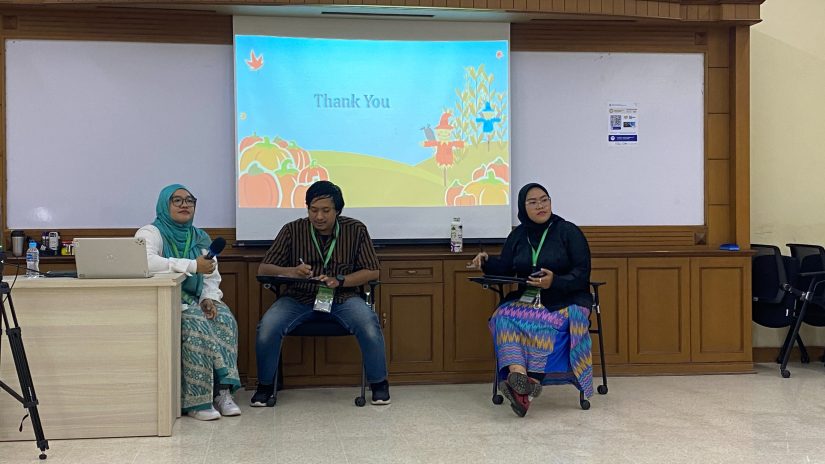
“How do you negotiate being a Muslim woman and a K-Pop fan?” was the question from one of the participants of the panel “Observing the Construction of Identity in Gender and Religion Transcends Cross-Border Boundaries” at the AAS-In-ASIA forum on Thursday, July 11, 2024. The intertwining of religion, identity and popular culture has always been an interesting topic to discuss, especially in academic spaces. Not only about K-Pop, the panel held on the last day of AAS-In-ASIA at Universitas Gadjah Mada also raised the theme of Muslim punks, the stigma of female writers, and the definition of women’s bodies. In this forum, three people from the big family of Cultural and Media Studies at Universitas Gadjah Mada, consisting of graduate students and alumni, participated.
The first presentation was opened by Cristina Duque Martinez virtually with the title “Sensuality in Hip Movements: Is the Identity of Women a Comparative Understanding of Value between Ecuador and Indonesia”. Her research focuses on how the body acts as an identity assertion tool for women in Ecuador and Indonesia. In addition to talking about women’s bodies, Cristina also touched on postcolonial interventions that melted into dance, stories, and sensuality.
After talking about dance, the panel discussion continued with a presentation from Aldillah Rizky Adisti (Ara), a graduate student at KBM UGM. On this occasion, Ara delivered the results of her research, which talked about K-Pop fans who made da’wah forums on Telegram with “Telegram as a Comfortable Virtual Space: A Netnographic Research in the Da’wah and K-Pop Communities.” One of the findings of this research shows that there is an arena for negotiation and de-stigmatization among Muslim K-Popers. K-Pop, as something that does not come from Islamic culture, is often called haram by certain Islamic groups. Thus, many K-Pop fans, especially women, cannot openly express themselves. This research found that there is a negotiation arena in the form of a Telegram channel that always plays K-Pop songs before holding recitation (studying Islam). In this forum, female K-Popers can feel safe expressing themselves while still practicing Islamic teachings.
The discussion that crosses between popular culture and Islam then continues in the next case, punk. Punk is familiar with hardcore music, the streets, and some actions that are often considered far from religion, as redefined by M. Fahmi Nurcahyo in his research entitled “Muslim Hardcore What We Stand for: The Struggle of Identity Politics and Redefining Punk.” In this research, Finchy (the nickname of M. Fahmi Nurcahyo) describes how a hardcore punk band from Surabaya called “The Fourtys Accident” redefines the term “punk” by declaring their group as “Muslim Punk.” The presence of punk Muslims is a counter hegemony to the previous punk identity, which is generally far from religion. This group dialogues Punk identity with Islam.
The panel was then closed by Adhani Juniasyaroh Emha’s presentation on Muslim women’s literature entitled Understanding the Lives of Muslim Women in Different Parts of the World from Nara Ali’s “Rope That Binds” and Zoulfa Katouh’s “As Long As the Lemon Trees Grow.” In this paper, Syaroh tries to challenge the “Western” perspective that often overlooks Muslim women’s literature, which is considered to always contain liberation movements from patriarchal and religious systems. In fact, Muslim life is very diverse and has different backgrounds and cultures. In her analysis, Syaroh takes two examples of Muslim women’s literature that shows women’s diverse experiences: Nara Ali’s Rope that Binds (2023) and Zoulfa Katouh’s As Long as the Lemon Trees Grow (2022).
Author: Laillia Dhiah Indriani
Foto: Laillia Dhiah Indriani
SDG 5 (gender equality), SDG 9 (industry, innovation and infrastructure)
